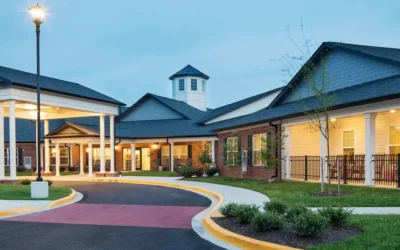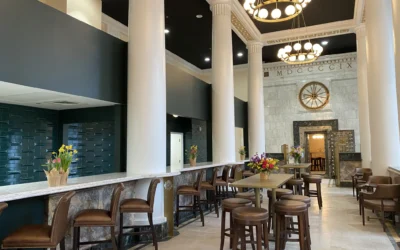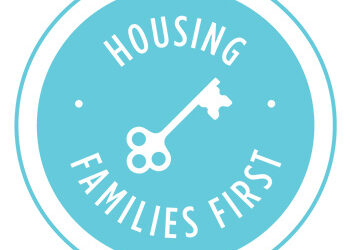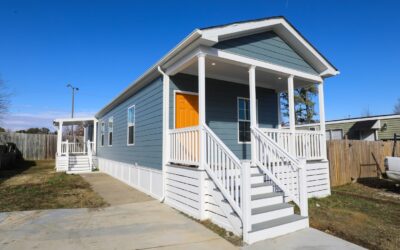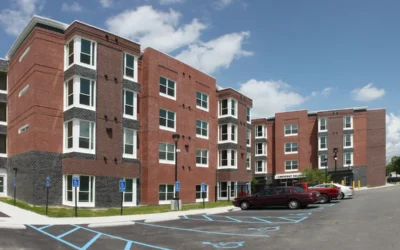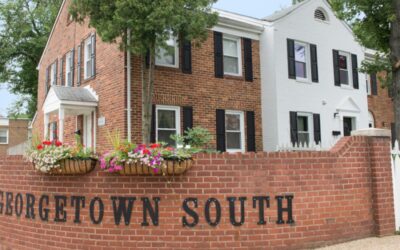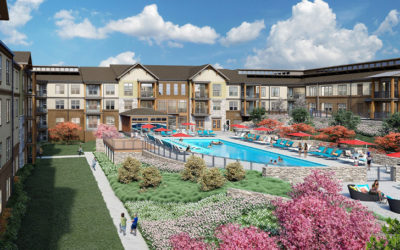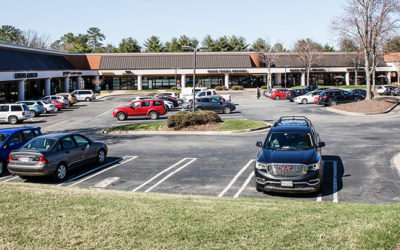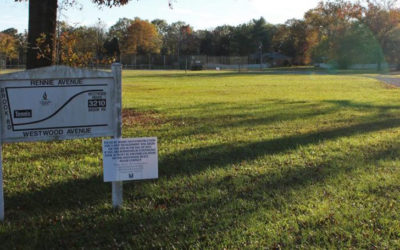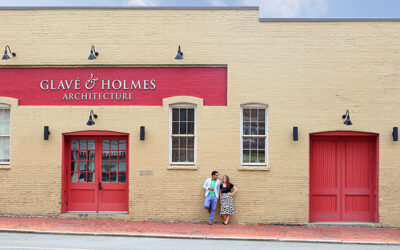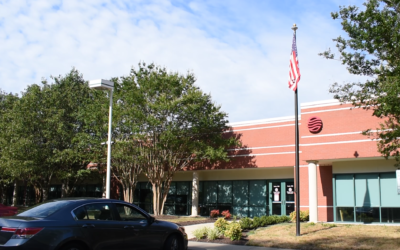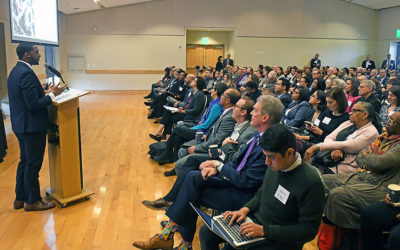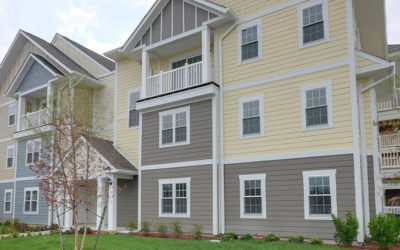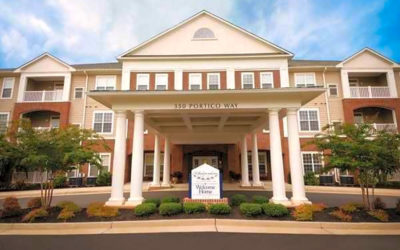Case Studies
At Gray Ryan Companies, we are proud of the successes we have helped co-create with our clients. Feel free to browse by industry or challenge below and discover how we’ve helped countless clients like you.
Spring Arbor Senior Living
The market for senior living communities – especially those with assisted living and memory care sections – remains highly competitive. Spring Arbor Senior Living was a regional senior living owner and operator with communities in Maryland, Virginia, and North Carolina. When Foundry Commercial acquired Spring Arbor they recognized the important of proactive communications to help senior living communities maintain robust census levels and attract new residents.
Mixed Use and Retail Development
Any new development project requires vision and a healthy appetite for risk. This is especially true for developers looking to catalyze growth in underserved areas. A local developer had the dream to create a new mixed-use community that included a variety of retail, housing, and office spaces in an established and underserved community close to downtown Norfolk, VA.
Showcasing Hospitality Design
Glave and Holmes Architecture, a national-recognized architecture and design firm, wanted to grow its business in the hospitality sector. The firm had a strong team and good relationships but was looking for new opportunities to expand its reach with hotel and resort developers, owners, and operators, particularly boutique and high-end hospitality.
TRC Companies
TRC is a global consulting, engineering, and construction management firm that provides environmentally focused and digitally powered solutions. The firm had recently acquired a regional engineering firm with a strong presence in Virginia and North Carolina. The acquired firm, Draper Aden Associates, had a 50-year history in the region and high brand awareness. After the initial merger announcement, TRC recognized the need to reinforce its new presence and differentiators. The firm wanted to highlight the new services and tools now available while emphasizing a commitment to existing clients and communities.
Nonprofit Merger and Launch
Two affordable housing organizations were at a crossroads. Both groups provided a variety of support and advocacy for organizations and individuals committed to affordable housing development and homeless services. After separate strategic reviews, the groups recognized that a merger could ensure their ability to leverage additional resources to meet their missions and make a more substantial impact. Gray Ryan provided strategic consulting throughout the merger process and identified a new name, branding, and messages to help the new organization not just retain all current members but grow.
Housing Families First
Homelessness is a complex and challenging issue. There are many contributing factors that push people into homelessness. Serving those experiencing homelessness is difficult work and made even harder but persistent and inaccurate stereotypes about individuals and families experiencing homelessness. Many homeless services agencies wrestle with how to tell compelling and concise stories about their programs and impact. Housing Families First, a Richmond, VA nonprofit that serves families with children experiencing housing instability and homelessness, wanted to build greater awareness and support for its work.
Greater Richmond Continuum of Care
The Greater Richmond Continuum of Care (GRCoC) is the Richmond region’s coordinated and collaborative network of homeless service providers. The network includes 34 local, mission-driven agencies. Given the complexity of homelessness services and the pernicious stereotypes about individuals and families pushed into homelessness, clear and concise messages from all partner agencies is crucial to ensure key audiences understand the reality around homelessness and how the region is successfully and compassionately responding.
Capital Campaign and Expansion
Housing Families First, a Central Virginia nonprofit that serves families with children facing housing instability and homelessness, was approaching the end of a highly successful capital campaign. The campaign, which was the largest in the organization’s history, raised over $4.5 million to expand its campus and programs serving families. Housing Families First wanted to build on this momentum and celebrate its newly expanded campus.
Homeward’s Pandemic Response
Fearing the deadly impact of COVID-19 on one of Central Virginia’s most vulnerable populations, individuals and families experiencing homelessness, Homeward and the Greater Richmond Continuum of Care (the region’s network of homeless service providers) launched and managed a massive and coordinate response. A variety of programs were created or adapted to ensure the health and safety of those experiencing homelessness and the frontline workers serving them. Among the strategies was the launch of an emergency pandemic shelter and consistent public communications with important facts about the pandemic response.
Agili, Your Personal CFO
Among the most competitive markets in the United States is financial planning and investment management. Estimates generally put the number of financial advisors at over 300,000 and the industry is expected to grow more than 13% by 2032. It can be challenging for firms to differentiate themselves in this crowded marketplace and demonstrate that they can be trusted advisors. Agili, a national financial planning and investment management, was a pioneering fee-only financial advisory firm when it launched 30 years ago. Through the years, the firm built an exceptional team and was an industry leader in terms of client retention. The firm, with offices in Richmond, VA and Bethlehem, PA, wanted to increase visibility and attract more clients.
Bermuda Estates
Challenge: : Bermuda Estates is a 7.8-acre manufactured home park with 46 units located in Chesterfield County. Due to ongoing health and safety risks in the park, it was purchased by project:HOMES in 2020. Project:HOMES made significant investments in the park including the addition of a new community center, the integration of supportive services to residents including ESL classes, and the replacement of several manufactured homes with energy efficient units. The organization was seeking to highlight these enhancements and demonstrate to potential donors that additional resources were needed to complete the revitalization of Bermuda Estates.
5000 Families Pilot Program
Challenge: The Virginia Housing Alliance is seeking support from the Virginia General Assembly to launch a new pilot program designed to provide $100M in rent relief over a two-year period to 5,000 low-income families with school-aged children across Virginia. Managed by the Department of Housing and Community Development, the 5000 Families pilot program will empower families and set up students for success. To build support for the 5,000 Families program, a comprehensive and strategic advocacy and public relations campaign would be needed.
Supportive Housing Campaign
Challenge: Virginia Supportive Housing is the largest statewide non‐profit organization that serves homeless adults by providing permanent, supportive housing. In conjunction with its 25th anniversary, Virginia Supportive Housing was seeking to expand its footprint in Hampton Roads with the development of several new communities. To facilitate that growth, it needed to communicate the importance of permanent, supportive housing to both the general public in the cities of Virginia Beach and Norfolk as well as elected officials.
Georgetown South 50th Anniversary
Challenge: Georgetown South is a master-planned, townhome community home to 1,000 residents in the city of Manassas, just 30 miles from the heart of Washington, D.C. As a result of the Great Recession, the community was facing a crisis due to high foreclosure rates, increased crime, and deteriorating conditions of the amenities. A housing advocacy group built a coalition of financial partners including Bank of America and the Virginia Housing Development Authority to stabilize Georgetown South through the development of new amenities, crime prevention programs, and the introduction of new financing tools which would allow the homes to remain affordable.
Chesapeake Square Mall
Challenge: An underperforming mall in Chesapeake, Virginia fell into foreclosure in 2016 after several anchor tenants closed their operations. The 717,000 sq./ft. mall quickly became an eye-sore to the Western Branch community as the lender refused to make any substantial investments. In 2018, Virginia Beach-based Kotarides Holdings purchased the property as part of a strategic plan to revitalize the area and make it a destination for new business and residents.
HHHunt
Challenge: One of the largest developers in the Mid-Atlantic, HHHunt Corporation develops, builds, and manages residential real estate communities, including new homes and apartments, in Maryland, Virginia, North Carolina, and South Carolina. The company set ambitious growth goals across its various markets to fuel long-term expansion plans. These efforts would require a sustained and strategic marketing campaign across HHHunt’s footprint.
2000 West Creek
Challenge: A Tennessee-based multifamily developer was looking to re-enter the Greater Richmond market with the development of two new projects representing a $110 million investment. One of those projects was 2000 West Creek. Located in the West Creek submarket, the asset was the first of its kind to be built in the area and represented a major departure from the traditional multifamily communities nearby based on size, amenities offered, and floor plans.
Senior Living Portfolio
Challenge: A national REIT decided to consolidate its senior living portfolio under one operator in order to enhance profitability. This meant that the remaining operator would need to on-board 10 new communities into its portfolio within a three-month period. Both the REIT and the operator wanted to share news about the consolidation with senior living industry publications and local news organizations where the communities were located. They also wanted to create a seamless digital transition on social media.
Senior Living Crisis Response
Challenge: A senior living operator faced a crisis over a situation at one of its communities in which a resident passed away after an altercation with another resident suffering from dementia. The situation around the matter was very sensitive. Gray Ryan Communications was brought in to assist after the family of the deceased resident sued the senior living operator and held a press conference to announce the lawsuit. Our team crafted a comprehensive plan in a short period of time designed to mitigate the fallout from the lawsuit and protect the reputation of the operator and community.
Stony Point Shopping Center
Challenge: Stony Point Shopping Center in south Richmond suffered a major set-back when its anchor grocery tenant vacated the property due to the company’s decision to leave the market. Despite having numerous other tenants including restaurants, specialty retailers, and boutique stores, sales at remaining retailers started slowing after the grocery tenant left.
Class A Office Tower
Challenge: Due to a number of events, the vacancy rate of a 30-year-old, 26-story, Class A office building in Richmond, Virginia’s central business district climbed to 25 percent. As a result, the owner of the building hired a new regional commercial brokerage firm to manage the leasing process for the asset. Both the owner and the brokerage firm wanted to communicate the new relationship and highlight planned improvements to the building in order to increase the number of tenants and encourage lease renewals of existing tenants.
Abberly Avera
Challenge: The multifamily market in Northern Virginia is both highly competitive and lucrative. HHHunt Apartment Living had entered the market and experienced success with its first new community in the region. Abberly Avera would become one of its most ambitious projects and represented a total investment of over $60 million. Reaching potential residents during construction and lease up would be critical to the community’s viability.
Virtual Dementia Experience
Challenge: Dementia is one of the fastest growing diseases in the United States. Approximately 140,000 Virginians suffer from Alzheimer’s Disease or other forms of dementia and that number is expected to grow 35% by 2025. Commonwealth Senior Living wanted to highlight this statistic and to provide medical professionals, first responders, family caregivers, and interested individuals an opportunity to learn and gain a better understanding for the challenges those with dementia face. Commonwealth partnered Second Wind Dreams to offer its Virtual Dementia Program at its two dozen senior living communities.
Westwood Tract Development
Challenge: When Union Presbyterian Seminary sold a parcel of land adjacent to its campus to a leading national multifamily developer, a vocal group of neighbors organized to block the development. Despite the need for new, quality housing in the community, this classic NIMBY effort played out in legal courts and the court of public opinion, threatening the development’s viability and Union’s long-standing reputation.
Emerald Homes
Challenge: The Great Recession was a difficult time for home builders. Sales of new homes plummeted to historic lows. Emerald Homes, had a presence in Powhatan County, New Kent County, Prince George County, and Chesterfield County but sales had completely dried up in 2008.
Glave & Holmes Architecture
Challenge: Celebrating five decades of success, Glave & Holmes Architecture was known for its traditional and classical style. Based in Virginia, the firm had evolved significantly during its history and had ambitious growth plans in both existing and new markets. The firm wanted to reintroduce itself to current and potential clients and better highlight its incredible work to support business development efforts.
Signature Lease Negotiations
Challenge: A large owner of office, retail, and industrial space in Hampton Roads, VA undertook a strategic decision to bring its leasing operations in-house in order to maximize its ability to negotiate with current and prospective tenants. Gray Ryan Communications helped the leadership of KPM create a comprehensive public relations campaign designed to highlight signature lease negotiations that the company was able to undertake with the new arrangement and to showcase that these leases demonstrated how the company was ready to make deals that benefited the end-user, local community, and the owner.
Providence
Challenge: A master-planned new home community in Ashland, Virginia, Providence began development in 2012 at a time when home sales continued to lag due to the effects of the Great Recession. The developer wanted to build excitement about Providence by replicating the small-town charm of Ashland within the community. That meant creating an environment that promoted walkability, created natural gathering spaces, encouraged neighbor interaction, and had the feel of a close-knit community.
Draper Aden Associates
Challenge: Draper Aden Associates, an engineering, surveying, and environmental services firm, had an impressive project list and lengthy roster of clients in Virginia, but had not gained earned media coverage in a number of years and was having trouble expanding its reach to the broader Mid-Atlantic region. The firm recognized the need to raise awareness in new markets about its powerful track record of success and growing services. Furthermore, the engineering sector was becoming increasingly competitive.
Virginia Tech Land Development and Design Initiative
Challenge: Virginia Tech Land Development and Design Initiative’s activities have been funded almost exclusively through annual corporate sponsorship. With financial support on the decline, LDDI’s leaders recognized the need to enhance the program’s reputation among the private land development community.
Richmond Regional Housing Framework
Challenge: Similar to many communities around the country, the Greater Richmond region in Central Virginia was facing a growing housing crisis. Yet, awareness and urgency to act was lagging. The Partnership for Housing Affordability (PHA) recognized the need to galvanize support around this issue and provide tangible solutions. The result was the Richmond Regional Housing Framework, a report that addressed the region’s shared housing challenges and provided dozens of regional and hyper-local solutions.
Richmond Parade of Homes
Challenge: The Home Building Association of Richmond’s Parade of Homes – a month-long event that showcases the latest new home trends – is a signature program that increases awareness about local homebuilders and promotes the sales of new homes. The multi-site showcase had taken place for over 70 years and needed to stay fresh to attract buyers to homes in the Parade.
The Village at Gateway
Challenge: South Norfolk was an economically distressed area in Chesapeake, VA that needed a new vision. That catalyst for change was The Village at Gateway. The developer of The Village at Gateway saw a brighter future for the historic community that included a dynamic mixed-use community with retail and office space, condos, and community amenities, such as a new public library. However, the developer needed, and lacked, support from neighbors and community leaders to make this vision a reality.
Branch Builds
Challenge: After 55 years in business, Roanoke, Virginia-based Branch & Associates, a general contracting firm, was facing tremendous competition in three markets where it has offices: Richmond, VA; Herndon, VA (Northern Virginia/metro DC); and Charlotte, NC. In the highly competitive construction field, name recognition is essential to winning new business. Senior leaders recognized a need to reintroduce the company in these new markets in order to grow business opportunities. Branch & Associates became Branch Builds – a name that better reflected the firm’s work and could highlight their expertise.
Keiter
Challenge: The accounting industry is highly competitive. The “big four” dominate the landscape using their size and reach to snap up clients and talent. Keiter, the largest, independent accounting and consulting firm in Central Virginia, was looking to differentiate itself from larger competitors by highlighting the expertise of its team members and demonstrate how the firm’s work with clients was more personal and customized. The objective was to build new business and solidify Keiter’s place in the market.
The Independence
Challenge: A new independent living community in Charlottesville, Virginia was failing to meet its occupancy census and goals. The Independence offered residents over the age of 55 spacious apartment homes, terrific amenities, and a highly skilled support staff. However, the community was not attracting its target audience and was at risk of closing its doors.

